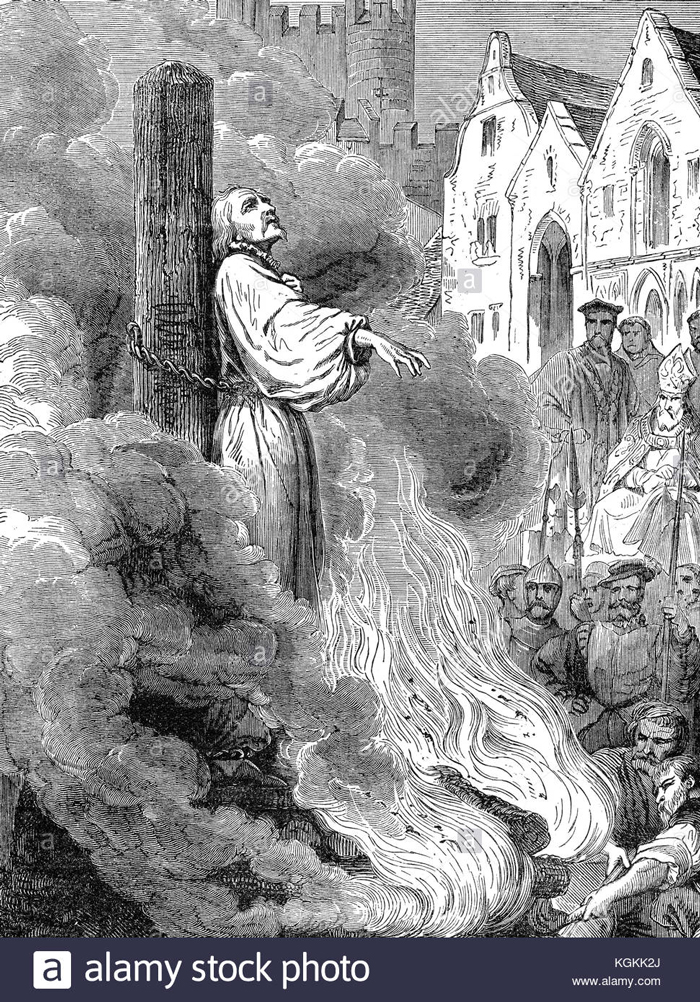
|
“Beware of false prophets, who come to you in sheep's clothing but inwardly are ravenous wolves.” Matthew 7:15 ESV |
Let us start by quoting the following paragraph from an article published at WLC:
"On October 27, 1553, John Calvin, the founder of Calvinism, had Michael Servetus, the Spanish physician, burned at the stake just outside Geneva for his doctrinal heresies. John Calvin, the originator of the popular doctrine of "once saved, always saved" (known in certain circles as "the perseverance of the saints") violated the cry of the Reformation — "sola Scriptura" — by murdering a doctrinal "heretic" without scriptural justification. The killing of Servetus was something Calvin had planned long before Servetus was even captured. Calvin wrote to his friend Farel on February 13, 1546 (seven years prior to Servetus' arrest). He went on record as saying: "If he [Servetus] comes to Geneva, I shall never let him go out alive if my authority has weight." Evidently, in that day Calvin's authority in Geneva, Switzerland, had ultimate "weight." This is why some referred to Geneva as the "Rome of Protestantism" and to Calvin as the Protestant "Pope of Geneva." (https://www.worldslastchance.com/biblical-christian-beliefs/servetus-ashes-cry-out-against-john-calvin.html)
 The reason that John Calvin was determined to kill Michael Servetus is because Servetus espoused non-Trinitarian views. According to Servetus, Trinitarians had turned Christianity into "tritheism," or belief in three gods. And on Christ, Servetus taught that Christ was made a man by Yahuwah, and his human nature prevents him from being eternal since he came into existence by the power of Yahuwah's Word in the womb of Mary.
The reason that John Calvin was determined to kill Michael Servetus is because Servetus espoused non-Trinitarian views. According to Servetus, Trinitarians had turned Christianity into "tritheism," or belief in three gods. And on Christ, Servetus taught that Christ was made a man by Yahuwah, and his human nature prevents him from being eternal since he came into existence by the power of Yahuwah's Word in the womb of Mary.
Such 'heretical' teachings by Servetus were too much for John Calvin to allow without severe punishment. The sentence he decreed was the burning on the stake of this saintly physician/theologian in the state on October 27, 1553.
Several Protestant churches throughout Switzerland pled with Calvin that Servetus be condemned but not executed. Nevertheless, Calvin ignored their pleas, and Servetus was burned at the stake. He was forty-two years old. Interestingly, before his burning at the stake in Geneva, he was condemned as a heretic by both the Catholics and Protestants.
About three-hundred-fifty years later, Seventh-day Adventist early pioneers were critical of John Calvin's legacy due to his unbiblical teachings and despotic treatment of his opponents. But that was not the case when it came to the writings of Ellen White about John Calvin. To the surprise of her contemporaries, she provided a positive picture of the life, teachings, and work of John Calvin. You will be hard-pressed to find a single explicit criticism of Calvin's teachings or actions in her coverage of John Calvin.
Ellen White stated the following: "While I am writing out an important matter, He [the Holy Spirit] is beside me, helping me"--Letter 127, 1902. If the Holy Spirit were beside Ellen White before writing out on any important matter, such as on John Calvin, would not the Holy Spirit lead her to condemn that 'reformer' who burned at stake a believer in the One God and who denounced the Trinity? Can you imagine the Holy Spirit doing the very opposite by leading Ellen White to extol John Calvin and not lead her to know about John Servetus, who paid the ultimate price for believing in Father Yahuwah as the only God, and denying the divinity of Yahushua?
|
A portion of the Great Controversy book was devoted to Calvin's life as a Protestant Reformer, where she presented Calvin glowingly positively cast in contrast to how her Adventist contemporaries viewed the Genevan reformer. The irony is that Ellen White introduced John Calvin as a torchbearer of Yahuwah's truth and the champion of 'religious liberty.' Throughout the chapter in The Great Controversy about Calvin, Ellen White portrayed Calvin as continuously led by Yahuwah into the more excellent light of divine truth. Ellen White seemed to be intent on putting Calvin in the best light possible by showing that he was a true reformer used by Yahuwah.
Can you imagine Father Yahuwah would commission a prophet/messenger who would extol the virtues of a despotic reformer responsible for the burning at the stake, one of His saints who denounced the Trinity and taught that only Yahuwah is God?
Let us suppose that Ellen White did not know about John Calvin's murder of Michael Servetus. That is a strong possibility. Can you imagine if Yahuwah's Spirit was indeed guiding the pen of Ellen White when she wrote the Great Controversy book, that His Spirit would not lead her to read about the murder of Servetus by Calvin? Could you imagine Yahuwah’s Spirit keeping Ellen White ignorant of the crimes of John Calvin toward one of Yah's courageous and faithful saints?
Ellen White stated the following: "While I am writing out an important matter, He [the Holy Spirit] is beside me, helping me"--Letter 127, 1902. If the Holy Spirit were beside Ellen White before writing out on any important matter, such as on John Calvin, would not the Holy Spirit lead her to condemn that 'reformer' who burned at stake a believer in the One God and who denounced the Trinity? Can you imagine the Holy Spirit doing the very opposite by leading Ellen White to extol John Calvin and not lead her to know about John Servetus, who paid the ultimate price for believing in Father Yahuwah as the only God, and denying the divinity of Yahushua?
What is more likely to have happened if the Holy Spirit was indeed behind her writings? A chapter on extolling the life, teachings, and actions of John Calvin, or a chapter on the martyrdom of Michael Servetus at the hands of the Protestant ‘Reformer’ John Calvin?
Suppose you still believe that Father Yahuwah has indeed commissioned Ellen White to be His end-time spokesperson/prophet and that His Spirit was leading her in presenting the murderer of one of His saints in a very positive and glowing manner, in contrast to her Adventist contemporaries who were very critical of John Calvin. In that case, you will likely believe us if we claim we have a few bridges to sell at an exceptional discount.
